(page1).jpg.jpg)
Title: Colored American - July 29, 1837
Speaker or author: editor
Newspaper or publication: Colored American (1837 - 1842)
The writer responds to an article from another newspaper mentioning that no matter how rich or how well educated African Americans may become that they will never "...elevate ... to the level of the whites, in the United States."
Description of file(s): one scanned, two columned, newspaper page
(page1).jpg.jpg)
Title: Colored American - June 23, 1838
Speaker or author: editor
Newspaper or publication: Colored American (1837 - 1842)
The writer assures white society that African American men have no desire for amalgamation. He suggests instead that the continued system of slavery insures amalgamation more than the freedom of choice in marriage partners among freed African Americans.
Description of file(s): one scanned, one columned, newspaper page
(page1).jpg.jpg)
Title: Colored American - September 15, 1838
Speaker or author: editor
Newspaper or publication: Colored American (1837 - 1842)
The writer responds to an inquiry asking whether Thomas Rice, creator of the minstrel character "Jim Crow," was of mixed race.
Description of file(s): one scanned, one columned, newspaper page
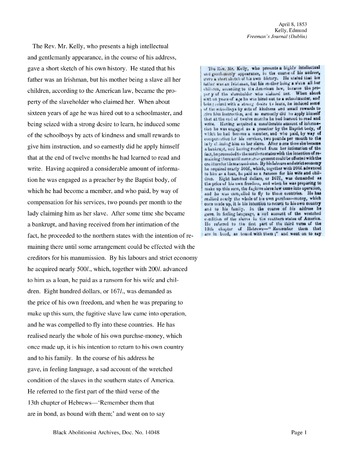
Speaker or author: Kelly, Edmund, b. 1818
Newspaper or publication: Freeman's Journal
Anecdotal speech regarding one man's experience with slavery. Although his father was Irish, his mother's race determined his condition as property of a slaveholder.
Description of file(s): PDF 3 page, 745 word document (text and images)
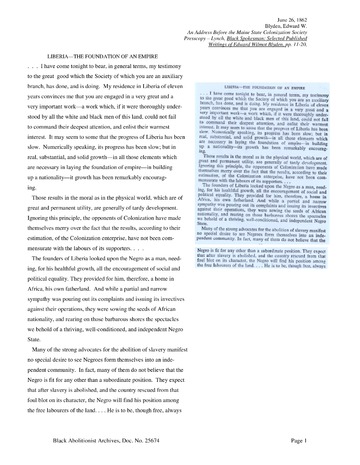
Speaker or author: Blyden, Edward Wilmot, 1832-1912.
Newspaper or publication: Presscopy -- Lynch, Black Spokesman: Selected Published Writings of Edward Wilmot Blyden, pp. 11-20
Speech supporting the African colonization efforts of freed slaves. The speaker emphasized the benefits of African Americans immigrating to Africa.
Description of file(s): PDF 12 page, 4,287 word document (text and images)
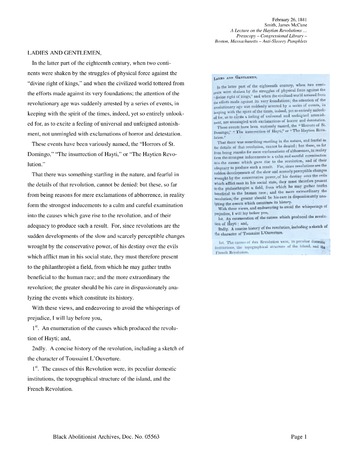
Speaker or author: Smith, James McCune, 1813-1865
Newspaper or publication: Presscopy -- Congregational Library -- Boston, Massachusetts -- Anti-Slavery Pamphlets
A lecture on the history of the Haytian Revolutions with a "character sketch" of Toussaint L'Ouverture given to benefit the Colored Orphan Asylum. The lecture outlines the class structure in Hayti and the timeline leading up to the revolutions from 1791 through 1803. (Speeches 06086, 06136, 06196, 06220, 06242, 06269, and 06309 are duplicates of this speech.)
Description of file(s): PDF 26 page, 9,292 word document (text and images)
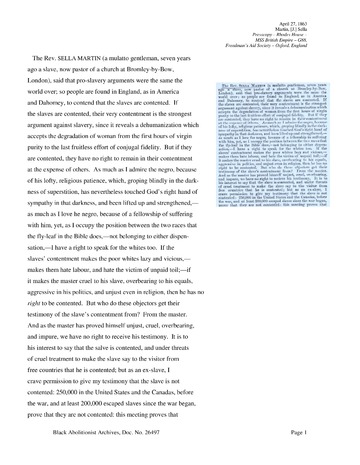
Speaker or author: Martin, J. Sella (John Sella), b. 1832
Newspaper or publication: Presscopy -- Rhodes House -- MSS British Empire -- G88, Freedman's Aid Society -- Oxford, England
Overview of a speech addressing the pro-slavery argument that the slave is content in his/her situation. This argument includes the idea that the slave has no right to his contentment if it interfers with another person's freedom. The speaker also eloquently addressed the argument of the inferiority of the black race.
Description of file(s): PDF 3 page, 968 word document (text and images)
(page1).jpg.jpg)
Title: Provincial Freeman - December 29, 1855
Speaker or author: editor
Newspaper or publication: Provincial Freeman (1853 - 1859)
The writer relates the stories of three mulatoo men named William. Each was raised by a single woman as her own child, and each chose a similar route to freedom.
Description of file(s): two scanned, two columned, newspaper pages
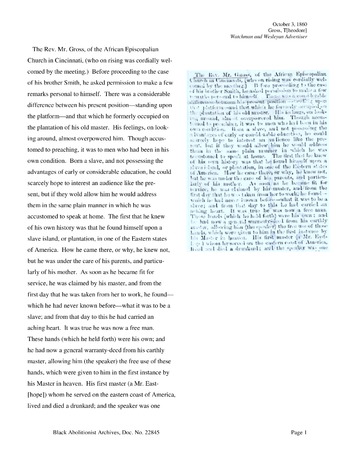
Speaker or author: Gross, Theodore, Rev.
Newspaper or publication: Watchman and Weslayan Advertiser
Detailed account of one man's experience with slavery.
Description of file(s): PDF 8 page, 2,255 word document (text and images)
(page1).jpg.jpg)
Title: Voice of the Fugitive - April 9, 1851
Newspaper or publication: Voice of the Fugitive (1851 - 1852)
The writer tells his readers that what the fugitive slaves living in Canada need more than anything right now is knowledge and strength. Instead of clothing and food, he asks those who want to help to contribute land and education. These will better help the poor and fugitives build their own futures.
Description of file(s): two scanned newspaper pages (three columns)
(page1).jpg.jpg)
Title: Voice of the Fugitive - March 12, 1851
Speaker or author: editor
Newspaper or publication: Voice of the Fugitive (1851 - 1852)
The writer expresses his opinion about the recent attempt to reinstate the black laws in Ohio.
Description of file(s): one scanned, two columned, newspaper page
(page1).jpg.jpg)
Title: Voice of the Fugitive - October 7, 1852
Speaker or author: editor
Newspaper or publication: Voice of the Fugitive (1851 - 1852)
The writer comments on James G. Birney's endorsement of the American Colonization Society's efforts to colonize Liberia.
Description of file(s): two scanned newspaper pages (three columns)
(page1).jpg.jpg)
Title: Weekly Anglo-African - April 14, 1860
Speaker or author: editor
Newspaper or publication: Weekly Anglo-African (1859 - 1862)
The writer compares the living conditions of the black and white populations in New York City. He also shares a comparison of the way the local press is reporting these conditions and how this reporting is racially biased. He shares with his readers the current status of the Anglo-African publications, and the daily social pressures endured by the editor and staff.
Description of file(s): two scanned, three columned, newspaper pages
(page1).jpg.jpg)
Title: Weekly Anglo-African - February 2, 1861
Speaker or author: editor
Newspaper or publication: Weekly Anglo-African (1859 - 1862)
The writer points to the inconsistencies in census taking of the African American and mulatto population in New York. He attributes this to poor record keeping, migration to other states and cities, and the fear inspired by the Fugitive Slave Law. From the writer's own experience he assures his readers that the population of African Americans in New York is much larger than reported in the 1860 census. He also notes that the number of interracial marriages is far greater than the number recorded in the census, estimating it to be closer to 200.
Description of file(s): one scanned, two columned, newspaper page
(page1).jpg.jpg)
Title: Weekly Anglo-African - May 19, 1860
Speaker or author: editor
Newspaper or publication: Weekly Anglo-African (1859 - 1862)
The writer discusses the current situation with race relations in the social structure. He's noticed how the overall social focus is on determining human worth by race. If African Americans are willing to agree with this system and degrade themselves to conform to it, the writer predicts a dire future for mankind.
Description of file(s): one scanned, two columned, newspaper page
spe.pdf.jpg)
Speaker or author: Allen, William G., fl. 1849-1853
Newspaper or publication: Leeds Mercury
Speech given before an English audience regarding the inhumanity and abuses of slavery in America. The speaker noted that he felt no prejudice in England, but gave examples of how his life is affected by prejudice in the U.S. (Includes MP3 audio file.)
Description of file(s): PDF 6 page, 1,982 word document (text and images)
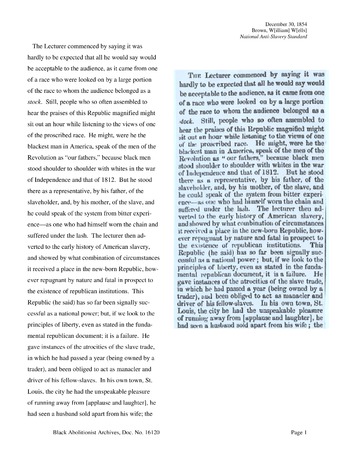
Speaker or author: Brown, William Wells, 1814?-1884
Newspaper or publication: National Anti-Slavery Standard
Speech regarding the negative image the American slaveholders and pro-slavery representatives offer people in Europe who judge all Americans by those they meet. The speaker (whose father was a slaveholder and his mother a slave) stressed the irony of a country founded on freedom that still maintained the institution of slavery.
Description of file(s): PDF 6 page, 1,429 word document (text and images)
spe.pdf.jpg)
Speaker or author: Brown, William Wells, 1814?-1884
Newspaper or publication: Anti-Slavery Bugle
The speaker addressed the issues of slave trading and "slave raising," and stressed that the acceptance of these had been passed down from generation to generation. As a mulatto, he believed he offered a type of bridge between races. He related a story of the kindness shown to him in Massachusetts that he hadn't known before, but stressed that this bit of kindness had not stopped him from working to end slavery.
Description of file(s): PDF 3 page, 878 word document (text and images)
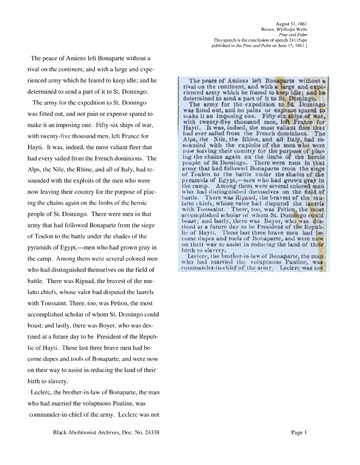
Speaker or author: Brown, William Wells, 1814?-1884
Newspaper or publication: Pine and Palm
The speaker described the turbulent history of Hayti in detail stressing the battles and triumphs of its military heroes. He stressed that those seeking to immigrate to Hayti would find it rich in natural resources, especially cotton and coffee, which offered competition to slave-grown produce in the U.S. [This speech is a continuation of speech 24115, published in the June 15, 1861 issue of the Pine and Palm.]
Description of file(s): PDF 13 page, 3,436 word document (text and images)



